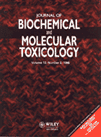
JOURNAL OF BIOCHEMICAL AND MOLECULAR TOXICOLOGY
Scope & Guideline
Pioneering Research in Biochemical Interactions
Introduction
Aims and Scopes
- Molecular Toxicology:
Research on how chemical compounds cause toxicity at the molecular level, including studies on DNA damage, oxidative stress, and signaling pathways. - Biochemical Mechanisms:
Investigation of biochemical pathways involved in toxic responses, such as metabolic activation of toxins and cellular repair mechanisms. - Pharmacological Interventions:
Exploration of protective agents and therapeutic strategies to mitigate toxic effects, including the use of natural compounds and novel drug formulations. - Environmental and Health Impacts:
Assessment of the effects of environmental toxins and pollutants on human health and ecosystems, including risk assessments and epidemiological studies. - Cancer Research:
Studies focused on the mechanisms by which toxins contribute to cancer development and progression, including the role of microRNAs and long non-coding RNAs. - Nanotechnology in Toxicology:
Research on the application of nanomaterials in drug delivery systems and their potential toxicological effects.
Trending and Emerging
- MicroRNA and Long Non-Coding RNA Research:
There is a growing body of research exploring the roles of microRNAs and long non-coding RNAs in toxicological responses, indicating an emerging interest in epigenetic regulation in toxicity. - Oxidative Stress and Antioxidant Defense Mechanisms:
Research focusing on oxidative stress as a central mechanism of toxicity has surged, with studies investigating how antioxidants can mitigate damage caused by various toxicants. - Natural Products and Phytochemicals:
An increasing number of studies are examining the protective effects of natural compounds and phytochemicals against chemical-induced toxicity, reflecting a trend towards exploring alternative therapeutic agents. - Nanotoxicology:
Research into the toxicological effects of nanoparticles and nanomaterials is on the rise, especially regarding their interactions at the cellular and molecular levels. - Environmental Toxicology and Human Health:
There is a heightened focus on the impact of environmental pollutants and toxins on human health, including studies that link exposure to specific chemicals with health outcomes. - Neurotoxicity Studies:
Emerging themes in neurotoxicology are prevalent, particularly studies elucidating the mechanisms by which various substances induce neurotoxic effects and neuroinflammation.
Declining or Waning
- Traditional Toxicology Studies:
There has been a noticeable decrease in studies focusing solely on traditional toxicology without molecular insights, as the field increasingly emphasizes molecular mechanisms and biochemical pathways. - In Vivo Animal Models:
Research relying heavily on in vivo animal models has waned in favor of alternative methods, including in vitro studies and computational modeling, as researchers seek to reduce animal usage. - Single Agent Toxicity Studies:
The focus on the toxicity of single agents is declining as researchers are more interested in the interactions between multiple compounds and the cumulative effects of exposure to mixtures. - Chemical Structure-Activity Relationships (QSAR):
Interest in classical QSAR studies appears to be diminishing, as advanced computational approaches and machine learning techniques are increasingly preferred for predicting toxicity. - Regulatory Toxicology:
There is less emphasis on studies directed solely at meeting regulatory requirements, as the field shifts towards innovative methodologies that advance scientific understanding and therapeutic development.
Similar Journals
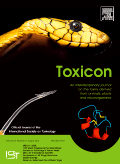
TOXICON
Navigating the Complexities of Toxicology with PrecisionTOXICON is a prominent peer-reviewed journal dedicated to advancing the field of toxicology and its related disciplines. Published by PERGAMON-ELSEVIER SCIENCE LTD, this journal has been a crucial resource for researchers since its inception in 1962, with a focus on disseminating high-quality research until 2024 and beyond. TOXICON features comprehensive studies spanning the biochemical, biochemical, and regulatory aspects of toxology, making it essential for researchers, professionals, and students alike. With a current impact factor that places it in the Q3 category of Toxicology and a Scopus rank of 67 out of 133 in its field, it serves as a valuable platform for innovative findings and discussions. Although it does not offer open access options, TOXICON's rigorous editorial standards ensure that published work meets the highest scholarly criteria, thereby enhancing its contribution to toxicological science.

TOXICOLOGY AND APPLIED PHARMACOLOGY
Connecting Research to Real-World ApplicationsTOXICOLOGY AND APPLIED PHARMACOLOGY, published by Academic Press, Inc. Elsevier Science, stands as a leading journal in the domains of toxicology and pharmacology, with its establishment dating back to 1959. With an impact factor reflecting its academic rigor and relevance, this journal is classified in the Q2 quartile for both pharmacology and toxicology categories, underscoring its significance in the scientific community. It ranks #34 out of 133 in Toxicology and #95 out of 313 in Pharmacology according to Scopus, placing it within the 74th and 69th percentiles, respectively. The journal aims to disseminate quality research that drives advancements in understanding the interactions of drugs and toxic substances within biological systems. Researchers and professionals are invited to contribute and engage with a broad spectrum of articles that cover mechanistic studies, risk assessment, and innovative therapeutic strategies. Although the journal does not offer open access, it continues to be a crucial resource for those who seek to navigate the complex interface of drugs and their toxicological implications.
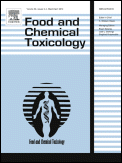
FOOD AND CHEMICAL TOXICOLOGY
Elevating standards in food science and toxicology.FOOD AND CHEMICAL TOXICOLOGY, published by Pergamon-Elsevier Science Ltd, is a prestigious journal with a significant impact in the fields of food science, medicine, and toxicology, reflecting its Q1 and Q2 quartile rankings in various categories as of 2023. Established in 1982, this journal continues to serve as an essential platform for disseminating high-quality research focused on the toxicological assessment of foods and chemicals, aiming to advance knowledge that affects public health and safety. With a pivotal role in integrating diverse disciplines, including pharmacology and agricultural sciences, the journal ranks impressively within the top percentiles—specifically 95th in Toxicology and 92nd in Food Science on the Scopus metrics. Though it operates on a traditional subscription model, the journal is committed to providing valuable insights and findings to researchers, professionals, and students across the globe, making it a vital resource in the ongoing discourse around food safety and environmental health. Its comprehensive scope underscores its importance in shaping evidence-based policies and practices.
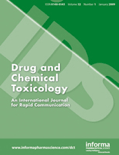
DRUG AND CHEMICAL TOXICOLOGY
Illuminating the path to chemical health and safety.Drug and Chemical Toxicology is a well-respected journal in the fields of toxicology, pharmacology, and public health, published by Taylor & Francis Ltd. Since its inception in 1978, this journal has diligently explored the effects and mechanisms of chemical exposures on health and the environment, fulfilling a crucial role in advancing scientific understanding and safeguarding public health. The journal is indexed across prestigious databases and features an impressive array of articles categorized within the Q2 and Q3 quartiles across various categories in 2023, reflecting its significance in Chemical Health and Safety as well as Environmental and Occupational Health disciplines. With an extensive reach and a focus on interdisciplinary research, Drug and Chemical Toxicology offers a rich repository of original research, reviews, and methodological advancements, catering to a diverse audience of researchers, professionals, and students dedicated to the betterment of safety and health standards. Although not an open-access publication, its articles are widely accessible to the academic community, ensuring that critical innovations and insights are shared for the greater good.
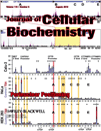
JOURNAL OF CELLULAR BIOCHEMISTRY
Advancing the Frontiers of Biochemical ResearchJournal of Cellular Biochemistry is a premier academic journal dedicated to advancing the field of biochemistry and cellular biology. Published by Wiley, this influential journal has a significant impact factor that underscores its relevance and authority within the scientific community. With its ISSN 0730-2312 and E-ISSN 1097-4644, the journal has been on the frontier of research since its inception in 1982, and is expected to continue publishing cutting-edge studies through 2024. As evidenced by its ranking in the 2023 Scopus Quartiles, it holds a rank of Q2 in Biochemistry and Q3 in both Cell and Molecular Biology, placing it among the top tiers of scientific journals in these disciplines. The Journal of Cellular Biochemistry serves as a vital resource for researchers, professionals, and students alike, providing a platform for the dissemination of innovative ideas and findings that shape our understanding of cellular processes and biochemical pathways. Though it does not currently offer Open Access options, its robust peer-review process ensures that each publication meets the highest academic standards, thus solidifying its esteemed position in the landscape of biochemical research.
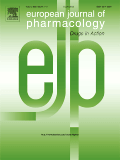
European Journal of Pharmacology
Fostering interdisciplinary collaboration in the realm of pharmacology.The European Journal of Pharmacology, a prestigious publication by Elsevier, serves as a vital resource in the field of pharmacology, offering rich insights into drug development and therapeutic applications. Since its inception in 1967, this journal has evolved to encompass groundbreaking research, including pharmacokinetics, toxicology, and innovative pharmacological methodologies, making it an essential platform for researchers and professionals alike. With an impressive impact factor that places it in the Q1 category of pharmacological journals and a Scopus ranking of #49 out of 313, the journal is recognized in the 84th percentile within its category, solidifying its significance in the academic community. Although the journal is not open access, it continues to attract contributions from leading scientists worldwide, ensuring that cutting-edge findings are disseminated effectively. The European Journal of Pharmacology not only highlights advancements in drug discovery and clinical applications but also promotes interdisciplinary collaboration, ultimately contributing to the progress of healthcare globally.
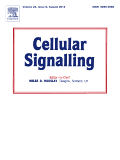
CELLULAR SIGNALLING
Elevating Insights into Cellular CommunicationCELLULAR SIGNALLING, published by Elsevier Science Inc, is a premier journal within the realm of Cell Biology, boasting an impressive Q2 category ranking as of 2023. With an ISSN of 0898-6568 and an E-ISSN of 1873-3913, the journal has established itself as a critical platform for advancing the understanding of cellular mechanisms and signal transduction pathways since its inception in 1989. Covering a vast array of topics in Biochemistry, Genetics, and Molecular Biology, it ranks notably at 87 out of 285 in the Scopus list, placing it in the 69th percentile among its peers. The journal serves as an invaluable resource for researchers, professionals, and students seeking high-quality, impactful studies that drive forward the field of cellular biology. While it operates under traditional subscription access, its highlights include rigorous peer-reviewed articles, reviews, and insights that continue to shape current scientific discourse.
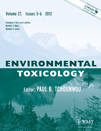
ENVIRONMENTAL TOXICOLOGY
Illuminating the Path to Safer EcosystemsENVIRONMENTAL TOXICOLOGY, published by Wiley, is a premier academic journal dedicated to the multifaceted study of toxic substances in the environment and their effects on human health and ecosystems. With the ISSN 1520-4081 and E-ISSN 1522-7278, this journal holds a prestigious position in the field, being ranked in the Q1 category across various relevant disciplines, including Health, Toxicology and Mutagenesis, and Management, Monitoring, Policy and Law. The journal regularly publishes high-quality research articles, reviews, and policy discussions aimed at understanding the implications of environmental toxins from 1980 to the present, contributing to the body of knowledge critical for the safety and sustainability of our environment. Researchers and professionals will find a treasure trove of information that not only highlights current trends and methodologies but also sets the stage for future advancements in toxicology. As a key resource, it provides valuable insights necessary for policy-making, environmental management, and public health, reinforcing its significance in the ever-evolving fields of toxicology and environmental science.

CELL BIOLOGY AND TOXICOLOGY
Connecting Cell Biology with Toxicological InsightsCELL BIOLOGY AND TOXICOLOGY, published by SPRINGER, stands as a vital journal within the realms of cell biology and toxicology, boasting an impressive 2023 Q1 ranking in its fields, alongside robust Scopus rankings placing it in the top 11th percentile for Toxicology and the 22nd for Health, Toxicology and Mutagenesis. With an ISSN of 0742-2091 and an E-ISSN of 1573-6822, the journal has been a cornerstone of scientific discourse since its inception in 1984, and will continue to converge innovative research until 2024. The journal focuses on the interplay between cellular mechanisms and toxicological implications, making it an essential resource for researchers, healthcare professionals, and students keen on advancing their understanding of these critical areas. Although it does not offer open access, its high impact and prestigious standing ensure that its publications reach a wide audience dedicated to significant advancements in the life sciences.
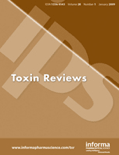
Toxin Reviews
Connecting Researchers to Practical ApplicationsToxin Reviews is a premier academic journal focused on the critical field of Toxicology, published by Taylor & Francis Inc. Established with an aim to foster research and disseminate knowledge, this journal has been pivotal since its inception in 1982 and continues to be a leading platform for both emerging and established researchers. With an impressive impact factor and ranked in the 75th percentile among its peers in the Scopus categories, it serves as an essential resource for scientists, practitioners, and students interested in understanding the complexities of toxins and their effects on health. The journal provides an Open Access platform, enhancing visibility and accessibility of research findings to a broader audience. Covering a wide scope, Toxin Reviews plays a vital role in bridging gaps between toxicological research and practical applications, ensuring that rigorous scientific inquiry translates into real-world solutions.